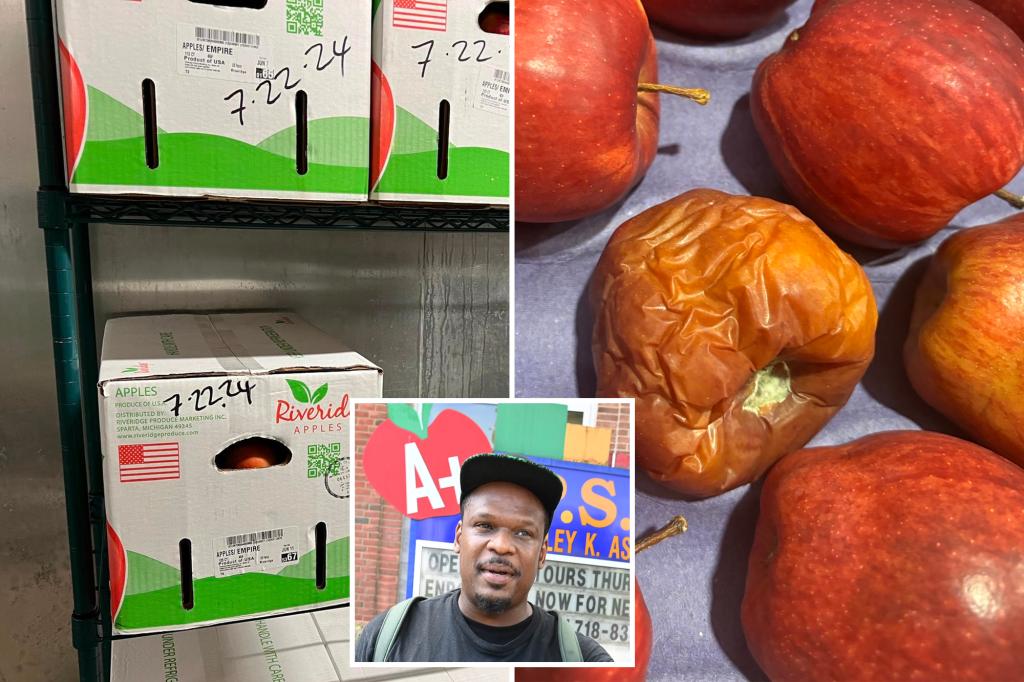Summarize this content to 2000 words in 6 paragraphs
They’re giving kids a core curriculum.
The NYC’s Department of Education food-service managers ordered three times as many apples as needed — forcing them to throw away thousands of cases of rotting fruit in the last four months, The Post has learned.
In March, the city DOE’s Office of Food and Nutrition Services got an offer they couldn’t refuse and ordered 279,000 cases of apples worth a whopping $5,585,580 paid for by the federal government. The deal was part of an effort between the feds and the state Office of General Services to give schools fresh produce from the US Department of Agriculture. As a result, the city recieved a massive “bonus” of free Empire, Fuji, Gala, Red Delicious and Granny Smith apples.
NYC got a massive “bonus” of Empire, Fuji, Gala, Red Delicious and Granny Smith apples.
But the nation’s largest school system bit off more than it could chew: The humongous order is overwhelming the DOE with more apples than schools can use in three years, kitchen insiders said.
“They have apples every day — nothing but apples,” said the parent coordinator at a Bronx elementary school, wondering what happened to the peaches and mandarins the schools used to serve.
A mom said she was puzzled why her son was bringing home “extra apples.”
Some students are served two apples at breakfast and another two at lunch, a food worker said.
Kids are being deprived of other fruit, the worker said. “Students are looking for a piece of watermelon, or a tangerine, but now it’s ‘Nope, we have to give you apples,’ and if students don’t want them, they go in the garbage.”
A supervisor griped: “You order one case of oranges, you get two cases of apples. You want bananas, you get two more cases of apples. We’re getting apples up the nose.”
Out of 5,299 cases of apples already delivered, up to 45% have already been tossed, the source estimated.
Stomach-churning photos show cases marred with moldy, rotten apples — some shriveled beyond recognition — and rancid juices soaking through the cardboard crates.
Food distributors had 28,012 cases on hand this week with 15,544 more to come in September, according to emails viewed by The Post.
“Despite warnings from distributors, managers and cooks that schools cannot handle such a large quantity of fresh apples, the OFNS decided to proceed,” said a DOE source, adding that officials saw it as “free money.”
“They ignored feedback that these apples would likely go to waste.”
Schools have been forced to take a glut of apples — some already spoiled and bruised — from distributors hit with nonstop supplies from the USDA. The agency offers periodic “bonuses” of free food products to schools across the country.
“We have rotting apples, and before we can take more we need to know what your plan is for discarding them as they all begin to rot,” one food distributor pleaded to an OFNS director in emails obtained by The Post.
“The apples will need to be accepted,” inventory management specialist Cristina Perez told the buyer.
“Please make arrangements for delivery,” director Lisa D’Amato confirmed.
Buyers are also complaining to the farms, begging them to do quality-control checks before shipping.
“We can’t tie up our warehouse everyday with thousands of cases of apples that are being shipped to us in very poor quality,” a distributor representative said in an email.
One of the city’s three grocery distributors said this week that the company will have to discard approximately 3,000 cases of apples. On Thursday, another tossed 86 cases, sources said.
In June, shortly before the school year ended, one of the distributors was slated to receive two shipments of 924 cases each. The fruit lasts 15 to 25 days.
Pre-packaged apple slices are popular, but many end up trashed as well. The snack from Champlain Valley Specialty, a longtime city contractor, often gets to schools on the expiration date, or a day before, and the fruit is already brown.
Many say the city should find a way to share excess fruit with the 1.2 million hungry people in NYC.
“A lot of people don’t even have food to eat,” said Jennifer Elbour, 69, whose grandson attends Summer Rising at PS 287 in downtown Brooklyn. “It’s ridiculous — there are so many needs in the city.”
“You could package them up and give them to the needy instead of just throwing them away,” agreed Julius Telfair, 35, who was picking up his niece from PS 287.
The DOE could also donate apples to the food-distribution charity City Harvest but officials do not want to admit they over-ordered, an insider said: “They don’t want to look bad.”
Officials said the DOE hasn’t received “any recent complaints of rotten apples.”
DOE spokeswoman Jenna Lyle called reports of the waste “unfounded,” and said schools can donate unused food.
Besides apples, Lyle claimed, schools “serve grapes, watermelon, pears and strawberries on a regular basis.”
“Healthy meals are core to the growth and success of our youngest New Yorkers, and we’re proud to provide free summer meals to all children ages 18 and under in the Big Apple.”
Additional reporting by Claire Samstag


